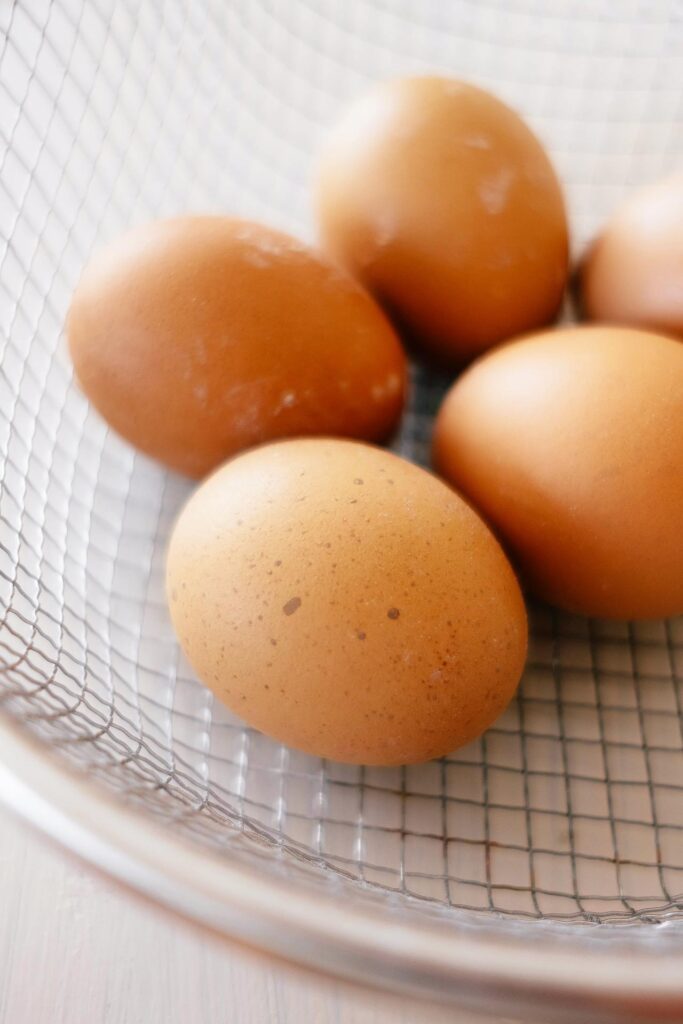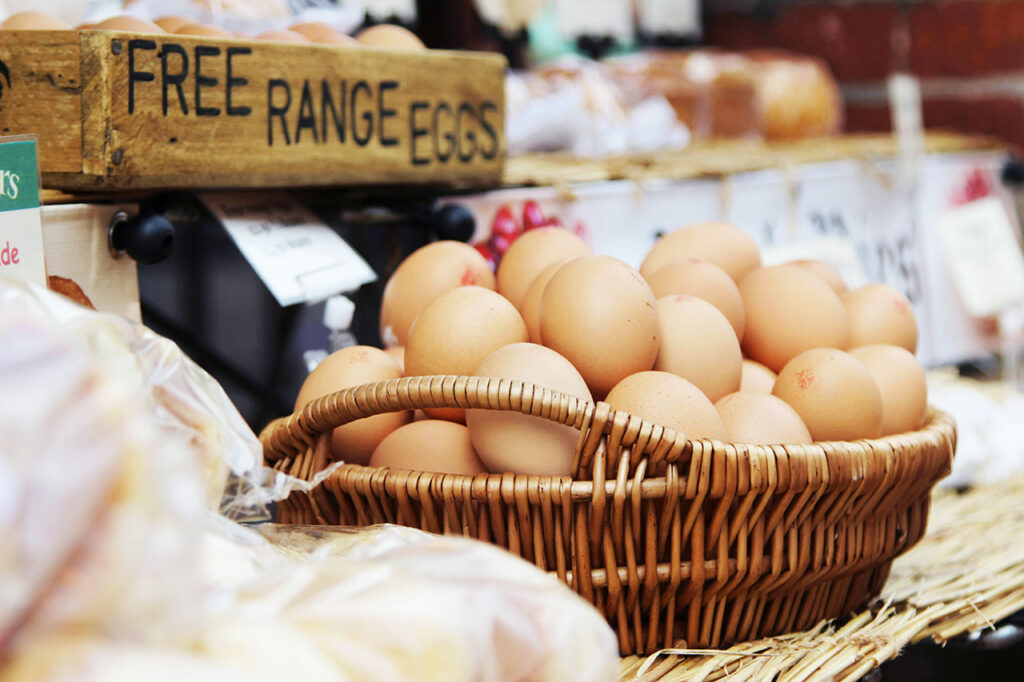Hard-Boiled Eggs
Hard-boiled eggs have been a staple for many around the world for centuries, dating back to ancient civilizations. They’re hard to beat for their ease of use and portability, not to mention their good nutrition. They make a great breakfast, brunch or snack on the go, and you can add them to salads of many kinds to add protein.
You can easily cook bigger batches of eggs this way and keep them in the fridge for snacks during the week. They are fantastic for meal prep.

What Are Hard-Boiled Eggs?
A hard-boiled egg means boiling an egg in hot water until both the egg white and yolk are cooked and firm. However, you have to be careful not to overcook them. You know they were overcooked if there is a green ring around the yolk when you cut the egg in half. I’ll talk more about how long to cook eggs below.
Introduction To Hard-Boiled Eggs
Over the years, eggs have gotten a bad rap in regards to health. But these days, we know better. There is absolutely nothing wrong with eggs! So unless your doctor or dietician tells you to avoid them, they are a great way to get plenty of healthy protein on the go.
The Symbolism Of Eggs
Eggs are a huge part of culture around the world. Every culture seems to have its own lore surrounding eggs. Here in the States, we see the symbolism of eggs as meaning “spring,” “newness,” “rebirth,” and “new beginnings.”
Christians associate eggs with Easter and the Easter Bunny and spend time painting and decorating eggs as part of those celebrations, despite the tradition of the bunny and eggs having pagan origins. I would not be one bit surprised to find similar traditions in other countries and faiths as well.
Nutritional Value Of Hard-Boiled Eggs
Large hard-boiled eggs have 77 calories per egg, 0.6 grams of carbohydrates, 5.3 grams of total fat, and 6.3 grams of protein. They are also a good source of vitamin D, B12, riboflavin, iron, and zinc.
How To Cook Hard-Boiled Eggs
- Traditional Stovetop Method: Gently lower eggs, one at a time, in a pot of boiling water, then let boil for 10-12 minutes.
- Instant Pot Method: Cook eggs on high pressure for 5 minutes, then quick release and transfer your eggs to an ice bath to shock them.
- Oven Method: Baked eggs are “hard-boiled” in a muffin tin at 325°F for 30 minutes, then shock them with an ice bath. This actually works great for over-medium-style eggs, too.
Soft-Boiled Eggs
You can’t write a guide to hard-boiled eggs without talking about soft-boiled eggs too.
Soft boiled eggs are simply achieved by boiling the eggs for a shorter amount of time. The whites are fully cooked, but the yolks will be runny. Many love to serve these in an egg cup for a fancier breakfast.
Things To Consider When Hard-Boiling Eggs
- Egg Age: The newer or fresher your eggs are, the harder it can be to peel them.
- Altitude: If you are at a higher altitude, you may need to lengthen your cooking times. See below for details.
- Shock: Cooking hard-boiled eggs is all about shocking the eggs. You shock them by putting them in hot, boiling water, and then shock them again when you put them into cold water after cooking.
Hard Boiling Eggs At Higher Altitudes
- Longer Cooking Times: Since water boils at a lower temperature at higher altitudes, it will take longer to cook your eggs. As a general rule of thumb, you should increase the cooking time by about 1-2 minutes for every 1,000 feet above sea level.
- Experiment: Your best bet is to try boiling eggs a few times to see what cooking time works best at your specific altitude. The good news is that once you figure it out, you can cook your eggs for that length of time every time.
Achieving Perfect Hard-Boiled Eggs
I learned in culinary school that the “perfect” hard-boiled egg is an egg where the yolk looks just barely cooked. Better still is if there is a slightly darker circle of gold or yellow in the middle of the yolk.
Generally speaking, you can follow the following guidelines, but you may need to experiment by about 1-2 minutes of cooking time that gets your eggs to your own preferred level of doneness.
- Creamy yolks – Cook for 9 minutes.
- Firmer yolks – Cook for 12 minutes.

How To Get The Peel Off A Hard-Boiled Egg
Do you struggle with removing the peel from your hard-boiled eggs? That comes down to two issues.
- The age of your egg.
- How well you shock your eggs.
If you are trying to hard-boil new or fresh eggs, you pretty much have to resign yourself to the struggle of peeling them. There really isn’t a magic trick for peeling fresh eggs.
Shocking your eggs is critical to get the shell to separate from the eggs. In my experience, this works best when you shock them going in (to boiling water), and shock them coming out (into ice water).
That said, we have really cold water here in Maine for much of the year, so I can thankfully just run my eggs under running water until the pot goes cold. Then I just let them sit for a bit in the cold water before peeling. but in warmer climates, ice helps a lot.
How To Crack Hard-Boiled Eggs
This is going to sound a bit odd, but I have practiced different ways to crack hard-boiled eggs over the years. Nine times out of ten, the best way to crack them to easily remove the shell is to tap each end of the egg on a hard surface, roll the egg on its side, and roll it with mild pressure against a hard surface to finish cracking it all the way around. This has been a tried and true method for peeling hard-boiled eggs in my family for a very long time. I swear by it.
Recipes For Hard-Boiled Eggs
Egg Salad: Chopped hard-boiled eggs mixed with mayonnaise, mustard, and seasonings. Here is another version from Cheerful Cook.
Deviled Eggs: Halved hard-boiled eggs filled with a mixture of yolks, mayo, mustard, and spices.
Egg Sandwiches: Sliced hard-boiled eggs layered with lettuce, tomato, and mayo on bread.
How To Safely Store Hard Boiled Eggs
To safely store cooked, hard-boiled eggs, it’s important to keep a few things in mind.
- Cooling: Cool your eggs down as fast as you can after cooking them. Shocking them in an ice bath is not just for easier peeling. It also lowers the temperature of the egg to safe levels before it has a chance to start growing any bacteria.
- Peeling (Optional): If you aren’t going to eat your hard-boiled eggs right away, it’s best to store them with the shell still on. This protects the egg from contaminants.
- Storage Containers: It’s best to keep cooled eggs refrigerated in an airtight container.
- Refrigeration: Store your container of hard-boiled eggs in the fridge at a temperature of at least 40°F or lower.
- Avoiding Cross-Contamination: Keep things like raw meats away from cooked food in the fridge. Raw meats should be stored on the bottom shelf of your fridge anyway. This way, you won’t contaminate foods like hard-boiled eggs by dripping juices on them when you move things around in the fridge.
- Shelf Life: Hard-boiled eggs, if stored in the fridge properly, will last 3-5 days. While you can probably safely consume them for up to a week, it’s best to stick to the shorter window for both food safety and the quality of what you’re eating.
- Transportation: Taking your hard-boiled eggs on the go? Make sure you pack your eggs with an ice pack. Hard-boiled eggs should be kept cold.
What To Do With Those Egg Shells?
So you’ve peeled all your eggs. Now what?
Did you know you can make your own “Miracle Grow Water” using egg shells? You can find those instructions here. My Oma did this during my entire childhood and always had a beautiful garden.
Other Ways To Cook Eggs
- Scrambled Eggs – This method is great for making omelets, too.
- Poached Eggs – This is similar to hard-boiling, just without the shell. It’s great for brunches and is a lower-fat option for breakfast.
- Fried Eggs – Cooked in a pan with oil, you can make them sunny-side up, over-medium, or over-hard.
- Baked Eggs – This was briefly mentioned above but is more often done without the eggshell.
No matter how you cook them, eggs are a great addition to the diet of most individuals. There are always exceptions, but generally speaking, they are considered healthy. If you have questions about including eggs in your specific eating plan, please consult a registered dietician.


